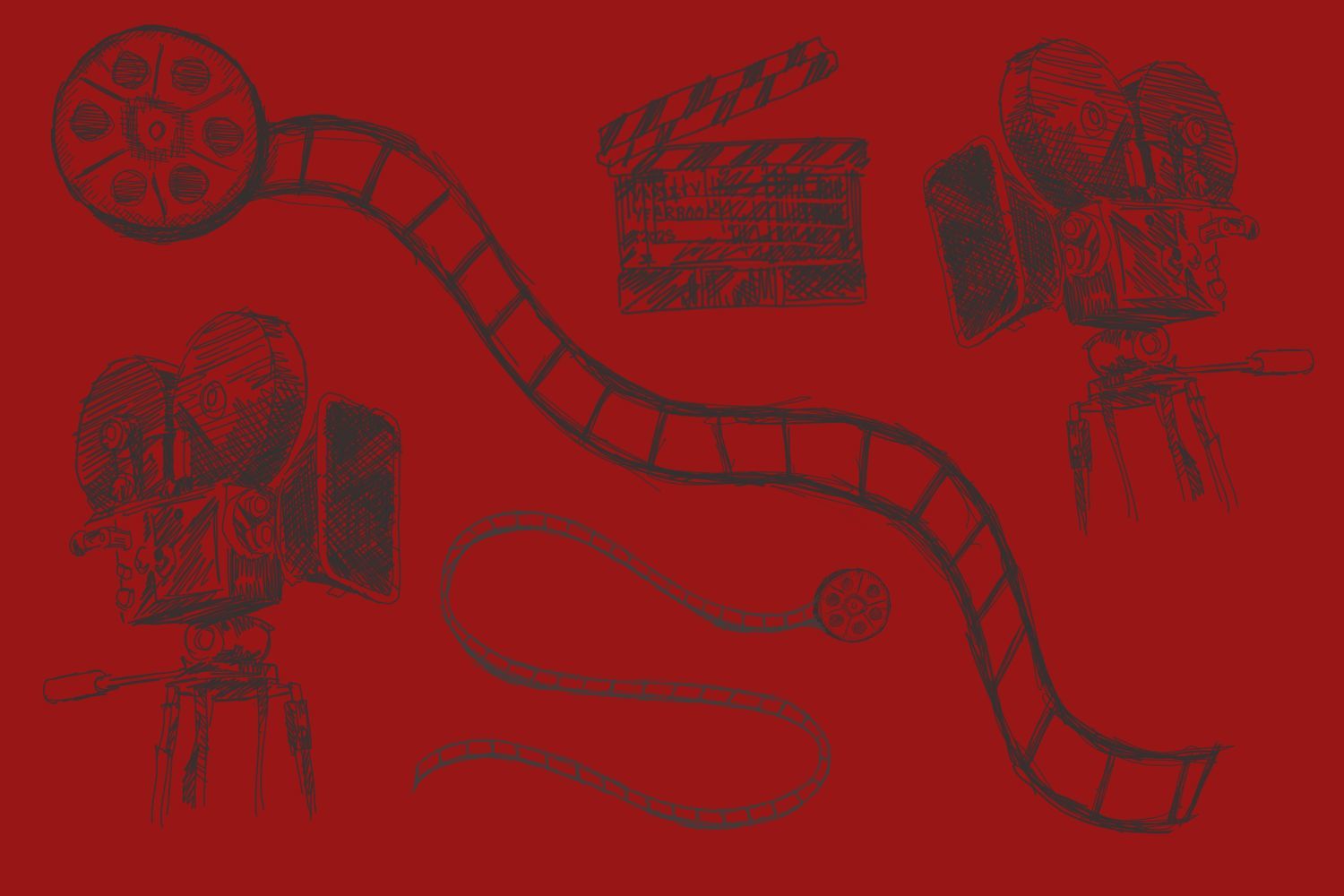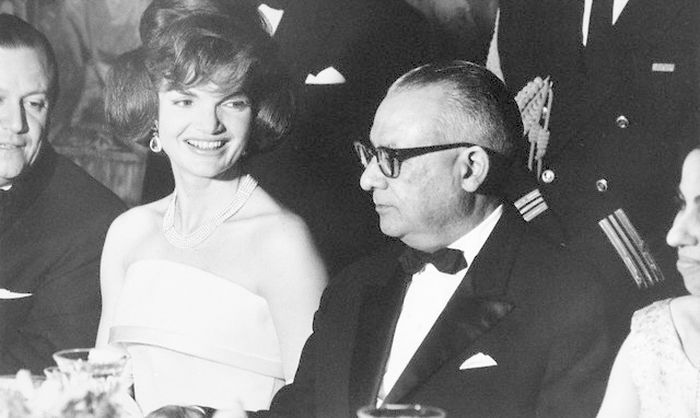The Cambridge film scene, though quieter than some of its more established counterparts, thrives with a palpable energy. We spoke to the filmmakers and curators bringing film, in all its styles, to the students of Cambridge.
Zebulon Goriely: President of Gonville & Caius’ Shadwell Society and the 2023/24 Director of the Watersprite Festival
On a quiet afternoon, before the rush of Easter term began, we met with Zeb, a final-year PhD student. When he arrived at Cambridge eight years ago, the student film scene was far from the vibrant and diverse community it is today. Zeb’s entry into filmmaking began in 2017, when he first dipped his toes into the world of YouTube vlogging. “When I joined […] there wasn’t much of a film scene,” he recalls. “What there was at the time was a big YouTube scene.” His initial ventures into creating content were born from a personal curiosity to document and share his experience at Cambridge: “I was just interested in learning how to film things and make them cinematic.”
Cambridge, though undeniably intertwined with his experience, was never meant to be the star of his work. “To a certain extent, yes, it’s where everything is set, but I never tried to glamorise Cambridge,” he explains. “I think there’s a harmful angle of trying to show Cambridge as this gorgeous beautiful place full of elite people. I was trying to show it as just another human experience”. His short film, Day in the Mind which was published as a part of the digital Mays Anthology during the pandemic, captures exactly this.
As the 2023/2024 director of the Watersprite Film Festival, Zeb found himself immersed in a world of passionate filmmakers, actors, cinematographers, and scriptwriters. Although he recently had the opportunity to attend the BFI Future Film Festival last year, where his short film 36,000 Words for Love won the Best Micro Short Award, he maintains that there is something special about Watersprite. Most of its filmmakers are showcasing their work for the very first time, and so the final climax (the award ceremony) is very difficult to get right. But, over the years the festival has managed to nail the snappy efficiency required whilst also “still get[ting] all of that emotion from the film makers who are really pleased to have their work recognised”.
Lexi Kentridge: the Celine Sciamma Q&A at Jesus College
It’s not every day that a filmmaker of international acclaim walks the hallowed courts of our colleges. But when Céline Sciamma, the celebrated French director behind Portrait of a Lady on Fire, agreed to return to Jesus College for a second time, for one student, it became an opportunity to bridge the gap between academic study and lived cinematic experience. It’s one thing to watch a film like Portrait of a Lady on Fire in the comfort of your own room, after a long day of studying. It’s another thing entirely to discuss it with the director herself. A natural choice, of course, since Bande de filles (Girlhood) features on his reading list for his French course.
“These films are portals into a whole new, unexperienced world, and that’s almost as important”
Sciamma’s return to Jesus marked a rare chance for students to engage directly with a filmmaker whose work many have encountered both in and out of the supervision room. For Lexi, Portrait was a first watch — and a revelation. “I hadn’t seen Portrait before, so it completely took me by surprise. I actually had no idea what was going to happen at any point,” he recalled. “I was struck by how much raw emotion comes through in the cinematography, and I loved the colours throughout the film.”
But the real highlight came afterward; commenting on her conversations with the students and their questions, Lexi notices that “she was very genuine and approachable, and took everyone’s seriously”. The conversation touched on Bande de filles, as well as Sciamma’s experience working in English. What stood out most was Sciamma’s unguarded humour and the quiet surprise of her insights: “She mentioned she actually prefers talking about film in English and that her films tend to be more successful outside of French-speaking regions. That really surprised me.”
Fergus Selsdon Games and Aristide Chryssoulis: Cambridge World Cinema Society
Pivoting from filmmakers to film lovers, we meet two other PhD students also getting ready to say goodbye to their mounting history thesis and the haven of cinema they’ve nurtured, (the former perhaps with a grin on their face). Fergus, the president of Cambridge World Cinema Society, and Aristide, the treasurer, sit across from me, ready to discuss films over the ARC Cafe’s filtered coffees.
“They strive for independence, societal and cinematic, not connected to a college, course, or department”
Having been in the senior committee for three years now, they first attended the society as eager audience members. “I just love watching films,” Aristide admits, “and the Picturehouse is slightly lacking for non-mainstream cinema.” Fergus says “we wanted to tell a slightly different story about the kind of films that people couldn’t access, and this was our way of doing that. I mean Arts Picturehouse is great, they’re showing stuff that’s in cinemas right now, […] but we just wanted different stuff, older or obscure movies.” Having originally been hosted by Fitzwilliam College, the society began as a cash-in-hand system, with thematic months built on term cards taking place in a cozy, cinema-like auditorium. But over the past three years, they’ve expanded to screenings at Christ’s and St Johns, as well as their home-turf of Fitz.
That obscurity is what drew them and their growing members in: “We screened this film Black Cat, White Cat (1998) by the Serbian filmmaker Kusturica, and someone came up to us and said, ‘oh I feel so proud to be Balkan right now!’” Fergus recalls with a laugh. “We also screened this Romanian film 4 Months, 3 Weeks and 2 Days (2007) and it really hit for me because I’m from Romania.” But these films connect with new viewers, too – “often it’s people for whom these films are portals into a whole new, unexperienced world, and that’s almost as important”.
“I used to live in Paris,” Aristide adds, “where the cinema scene is huge, there’s a lot of independent cinemas – everyday day you can watch [films] for a very cheap price”. They both aim to bring this fervour to Cambridge, and part of that mission is their online membership scheme that was put into practice this past year – the price of a single cinema ticket, £10, for a year’s worth of 24 films (or £5 for a term!). They strive for independence, societal and cinematic, not connected to a college, course, or department.
Those Q&As seem particularly stand out; Fergus tells me of a “Holocaust screening earlier last term where we had a panel of Holocaust historians and some film scholars all talking about this very important film, Diamonds of the Night (1964). It gives everyone in the audience a way to chew on this quite challenging text, give it a contextual buttress as it were.” Another highlight of the year was the Palestinian documentary, No Other Land (2024), directed by Basel Adra, Hamdra Ballal, Yuval Abraham, and Rachel Szor in the face of the Israeli-Palestinian conflict. Aristide recalls how “the screening was absolutely packed, there was silence at the end, it was quite intense”.
Emily Knutsson: Director, writer, and co-lead of The Howling Corpus
On a bright Friday evening in Selwyn’s Quarry Whitehouse, The Howling Corpus, a brilliant short film by master’s student Emily Knutsson, made its haunting debut. Cambridge has always felt like a place where stories linger just beneath the surface, and for this student filmmaker, it offered just the right blend of myth and intimacy to bring a centuries-old ghost story to life on screen. This film draws its eerie charm from a 17th century urban legend said to haunt the Corpus Christi chapel. “It’s not too well documented,” she comments, “more of an urban legend here in Cambridge.” The idea took root when Emily was hired as a ghost tour guide: “I’ve always wanted to do something with doppelgängers and love, but never quite found the right story. Then this ghost story came along and I just thought it was perfect.”
Rather than shoot in Corpus itself, the film found a home in the darker, more secluded Caius chapel. “Corpus is beautiful, but it’s so much brighter with all that natural light,” Emily explained. “Caius was perfect” intimate, quiet, and precisely a place where “a pair of lovers might sneak away”.
Candlelight plays a central role: “The idea to shoot mainly by candlelight was actually my Director of Photography Richard Allen’s suggestion, and it was definitely the right call.” The shots are nostalgic, warm, and the screen almost sucks you into the medieval flashbacks. That intimacy is shattered in the final shot, a cold, sudden contrast that lands like a splash of icy water; the candles added such a romantic feel, which made the final scene hit so much harder.
Playing the lead whilst also directing and writing may sound chaotic, but it’s clear that Emily thrives in this triple-role. “I find I’m better at each role when I’m doing all three. I’m completely immersed. All my decisions come from instinct.” Behind the camera was a small but dedicated team: cinematographer Richard Allen and production designer Sean Patel-Gould, both London-based, alongside Toby Ellis, on sound, and fellow student Megan O’Neil as assistant director. The team filmed over two 14-hour days, shooting entirely at night. “We arrived at 2pm and wrapped around 4am. It was intense.” The cast was co-led by Finn Cullen, a final-year ASNAC student, who Emily first spotted during a production of Macbeth at the Round Church. “He embodied James more than anyone could” and it is impossible to imagine anyone else in that role.
But Emily is far from finished with the Cambridge film scene. The Howling Corpus was only their Cambridge debut. A new short, Forgery, shot in Queens’ College and set in the late 1960s, shot in April – with Cullen. With an undergraduate degree in history from Edinburgh, and now pursuing creative writing in Cambridge, Emily finds it hard to separate her studies and her passions. “All my work is rooted in finding parallels between modern life and history.” That approach defines not just her filmmaking but her dissertation project, “a play-slash-novel” heading to the Edinburgh Fringe. “Cambridge has given me the chance to build something bigger,” she reflects.


